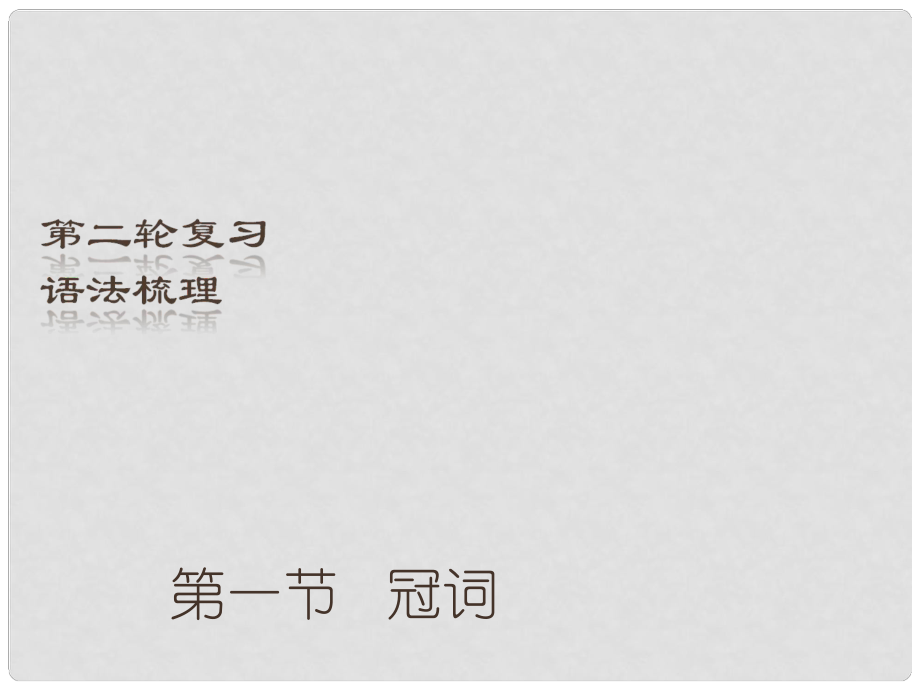《(深圳地區(qū))中考英語(yǔ)二輪復(fù)習(xí) 語(yǔ)法梳理 第1節(jié) 冠詞課件》由會(huì)員分享����,可在線閱讀,更多相關(guān)《(深圳地區(qū))中考英語(yǔ)二輪復(fù)習(xí) 語(yǔ)法梳理 第1節(jié) 冠詞課件(11頁(yè)珍藏版)》請(qǐng)?jiān)谘b配圖網(wǎng)上搜索����。
1�����、第一節(jié) 冠詞冠詞的基本概述1. 定義:冠詞是虛詞����,本身并沒(méi)有實(shí)在意義�,不能單獨(dú)在句子中充當(dāng)成分�,在句子中不重讀。2. 特點(diǎn):(1)冠詞位于名詞之前��,幫助說(shuō)明名詞的 含義(2)不定冠詞表示泛指(3)定冠詞表示特指冠詞的基本概述3. 常見(jiàn)的冠詞歸類:(1)不定冠詞a/an(2)定冠詞the(3)零冠詞/(即不用冠詞)考點(diǎn)考點(diǎn) 1 不定冠詞不定冠詞 a/an的基本用法的基本用法a用于其讀音以輔音音素開(kāi)頭的單詞前���; an用于其讀音以元音音素開(kāi)頭的單詞前�。1) 表示數(shù)量“一”���,一般與單數(shù)的可數(shù)名詞連 用���。 I have a computer at home. There is an apple in m
2、y hand.2) 泛指某一個(gè)人或事物中的一個(gè)�����。 An elephant is stronger than a cow.考點(diǎn)考點(diǎn) 1 不定冠詞不定冠詞 a/an的基本用法的基本用法3) 表示數(shù)量,有“每一”的含義����。 We have three meals a day.4) 用在序數(shù)詞前,表示“再一�,又一”。 You can try it a second time if you fail.5) 用在某些數(shù)目的表示法中��。 a hundred 一百 a quarter 一刻鐘 a thousand一千6)用于某些固定的短語(yǔ)中�����。 a few, a little, have a rest, a lot
3�、 of, have a good time考點(diǎn)考點(diǎn) 2 定冠詞定冠詞 the 的用法的用法1) 特指某(些)人或某(些)事物。 Beijing is the capital of China.2) 表示上文提到過(guò)的人或事物���。 My father has a car. The car is black.3) 指雙方都知道的人或物�����。 Please open the door.4) 用在世界上獨(dú)一無(wú)二的名詞前����。 The sun is bigger than the moon.考點(diǎn)考點(diǎn) 2 定冠詞定冠詞 the 的用法的用法5) 用在序數(shù)詞和形容詞或副詞的最高級(jí)前。 March is the thir
4�����、d month of a year. Peter is the tallest boy in the class.6) 用于樂(lè)器名詞前��。 Can you play the piano?7) 用于姓氏的復(fù)數(shù)形式前表示“一家人”�����。 The Greens live in London.8) 用于由普通名詞構(gòu)成的專有名詞前�。 The Great Wall/the United Nations考點(diǎn)考點(diǎn) 2 定冠詞定冠詞 the 的用法的用法9) 用于某些形容詞前表示“一類人”。 The young should take care of the old.10) 用于方位名詞前����。 Beijing is i
5�、n the North of China.11) 用在一些習(xí)慣用語(yǔ)中。 in the morning (afternoon/evening) /on the right/in the end 考點(diǎn)考點(diǎn) 3 零冠詞的用法零冠詞的用法1) 用于不可數(shù)名詞�����,復(fù)數(shù)可數(shù)名詞前表示泛 指�。 They are teachers.2) 在某些節(jié)假日,季節(jié)�,星期�����,月份���,年份 的名詞前。 He works from Monday to Friday. I went to Beijing in October, 2008. Teachers Day is on Sept.10.考點(diǎn)考點(diǎn) 3 零冠詞的用法零冠詞的用法
6����、3) 在一日三餐,語(yǔ)言�,學(xué)科,球類和棋類運(yùn)動(dòng)的名詞前����。 I usually have breakfast at 7. The girl speaks English well. We had a wonderful dinner last night.4) 在國(guó)名,地名����,人名等專有名詞前。 Mary is from France. Beijing is the capital of China.考點(diǎn)考點(diǎn) 3 零冠詞的用法零冠詞的用法5) 在稱呼語(yǔ)或表示頭銜的名詞前���。 Who is better, President Bush or President Obama?6) 當(dāng)名詞前有this, that, my, your, whose, some, any, no, each, every 等代詞時(shí)���。 I dont like this kind of chocolate. Is there anything in your other hand?7) 在某些習(xí)語(yǔ)及搭配中要用零冠詞�����。 at night/at work/go to school
 (深圳地區(qū))中考英語(yǔ)二輪復(fù)習(xí) 語(yǔ)法梳理 第1節(jié) 冠詞課件
(深圳地區(qū))中考英語(yǔ)二輪復(fù)習(xí) 語(yǔ)法梳理 第1節(jié) 冠詞課件

